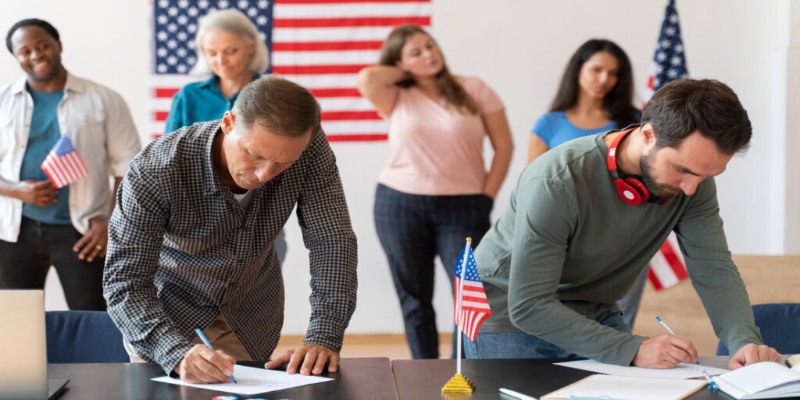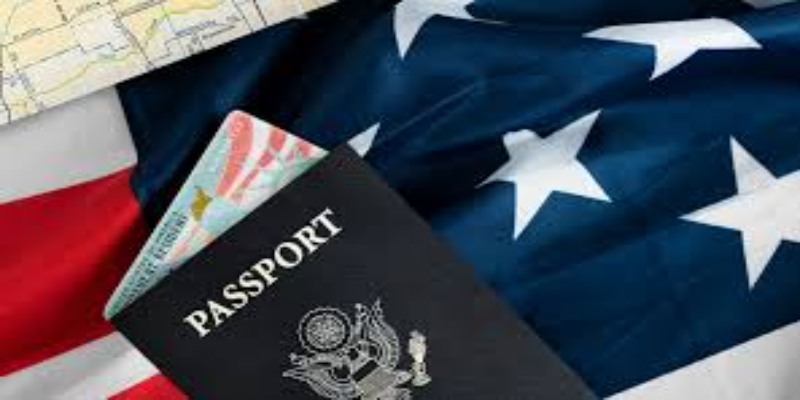Get free consultation
Fill out the form and we will contact you
Under U.S. immigration law, U.S. citizens aged 21 or older have the right to file a petition to sponsor their siblings for family reunification in the United States. Sponsored siblings receive a 10-year green card, allowing them to live, work, and study legally. However, long waiting times are a major challenge for the F4 category. So, how long does it take to sponsor siblings to the U.S.? Let’s explore the details.
The processing time for F4 sibling petitions is often lengthy because the number of pending applications far exceeds the annual visa quota (65,000 visas, with no single country exceeding 7% of the total). According to the latest statistics from the U.S. Citizenship and Immigration Services (USCIS) and the Visa Bulletin, the average waiting time for applicants from Vietnam ranges from 12 to 15 years, depending on…
Processing time for F4 sibling petitions is prolonged due to the backlog of applications
Backlog volume: Vietnam has a large number of F4 petitions, resulting in longer waiting times compared to some other countries.
Immigration policies: Changes in U.S. immigration laws can affect processing speed.
Priority date: Waiting time is calculated from when USCIS approves the I-130 petition until the Visa Bulletin reaches the applicant’s priority date.
Note: There is no way to shorten the F4 visa waiting time unless there is a major change in immigration policy. Preparing a complete application from the start will help avoid unnecessary delays.
To sponsor a sibling for U.S. permanent residency, both the sponsor and the beneficiary must meet the following requirements:
Must be a U.S. citizen (lawful permanent residents are not eligible to sponsor siblings).
Must be at least 21 years old.
Must have the financial ability to support the sibling, with a minimum income of 125% of the federal poverty guidelines.
Must provide proof of a blood relationship or a legal relationship (adopted child, step-sibling of a parent) with the beneficiary.
Must be a biological sibling (sharing both parents, or one parent) or a legal sibling (adopted before age 16).
Must have no criminal record, no serious legal violations, and no communicable diseases that prohibit entry into the U.S.
Spouse and children under 21 years old (CSPA age) may accompany the sibling if they meet eligibility requirements.
Must be a biological or legal sibling
According to USCIS regulations, sponsoring cousins to the U.S. is not allowed under the F4 category. If you want to bring cousins to the U.S., you may consider other options such as a student visa, employment visa (EB-3), or tourist visa. However, these categories do not lead to a green card and have their own specific requirements.
Process for sponsoring siblings to the U.S. under the F4 category:
File Form I-130: The sponsor submits Form I-130 (Petition for Alien Relative) with the filing fee ($625 for online submission, $675 for paper) and supporting documents proving the relationship (birth certificate, parents’ marriage/divorce certificates if needed).
Wait for USCIS approval: After approval, USCIS issues a Notice of Approval and forwards the case to the National Visa Center (NVC).
Complete the case at NVC: The sponsor submits Form I-864 (Affidavit of Support), pays the visa processing fee ($325) and the affidavit fee ($120). The beneficiary submits Form DS-260 along with supporting documents such as police certificates, passport, and 5x5 photos.
Interview at the U.S. Consulate: When the Visa Bulletin reaches the priority date, NVC schedules the interview. The beneficiary must bring all required documents and answer questions about the relationship and plans in the U.S.
Receive visa and enter the U.S.: If the interview is successful, the F4 visa is issued within 10–30 days. After entering the U.S., the beneficiary receives a green card within 2–3 months.
The beneficiary receives the green card 2–3 months after entering the U.S
Below are the necessary documents for the F4 category:
Copy of birth certificate, U.S. passport, or naturalization certificate.
Forms I-130 and I-864.
Financial evidence (tax returns, W-2 forms, employment verification letter).
Proof of relationship (shared birth certificates, adoption papers if applicable).
Passport valid for at least 6 months.
Police clearance certificate (issued within the last year).
Four 5x5 photos meeting U.S. visa standards.
Birth certificate, marriage certificate (if applicable).
Additional documents for adopted or stepchildren (adoption decree, parents’ divorce certificate).
Mẹo: Dịch thuật côngTip: Have all documents translated and notarized in English and carefully check them before submission to avoid additional requests.
The costs for sponsoring siblings to the U.S. include:
I-130 filing fee: $625–$675.
Visa processing fee at NVC: $325 per person.
Affidavit of support fee: $120.
Green card issuance fee: $220 per person (paid after entry).
Medical examination fee: approximately $100–$200 per person.
Travel, translation, and notarization fees: variable.
The average total cost per person is about $1,200–$1,500, excluding any additional expenses.
The average cost per person is about $1,200–$1,500 for sponsorship
To check the status of your application:
USCIS stage: Use your receipt number on the USCIS Case Status Online website.
NVC stage: Use your case number to track progress through the CEAC system.
Visa Bulletin: Check the monthly Visa Bulletin to see if your priority date has become current.
The interview at the U.S. Consulate focuses on verifying the relationship and immigration intentions. Common questions include:
Full name and date of birth of the sponsor and their spouse?
How many times have you met the sponsoring sibling? When was the last time?
What are your plans for living in the U.S?
Do you have other relatives in the U.S?
Interview tips:
Answer honestly and clearly.
Bring family photos, correspondence, or evidence of communication with the sponsor.
Prepare all documents carefully according to the NVC checklist.
The 12–15 year waiting period for the F4 category can be discouraging. Here are some faster alternatives to reunite with siblings in the U.S:
B-2 tourist visa: Suitable for short visits.
F-1 student visa: For siblings who wish to study in the U.S., with potential to later change to a work visa.
EB-3 employment visa: For skilled workers or professionals, processing time around 2–4 years.
EB-5 investment visa: Invest $800,000 in an approved project to obtain a green card in 1–2 years.
For those interested in faster immigration programs, Quoc Tich Thu Hai also offers investment residency solutions in Europe (Malta, Portugal) or the Caribbean (Antigua & Barbuda, Grenada), with processing times ranging from 6 months to 2 years.
Sponsoring siblings to the U.S. under the F4 category is a valuable opportunity for family reunification but requires patience due to the long waiting period of 12–15 years. Careful preparation of documents, regular tracking of your case, and understanding the process will increase your chances of success.
If you want to learn more or need professional support, contact Quoc Tich Thu Hai at https://quoctichthuhai.com/. With over 10 years of experience, we are committed to supporting you on your journey to immigrate to the U.S. and other countries.
Fill out the form and we will contact you




